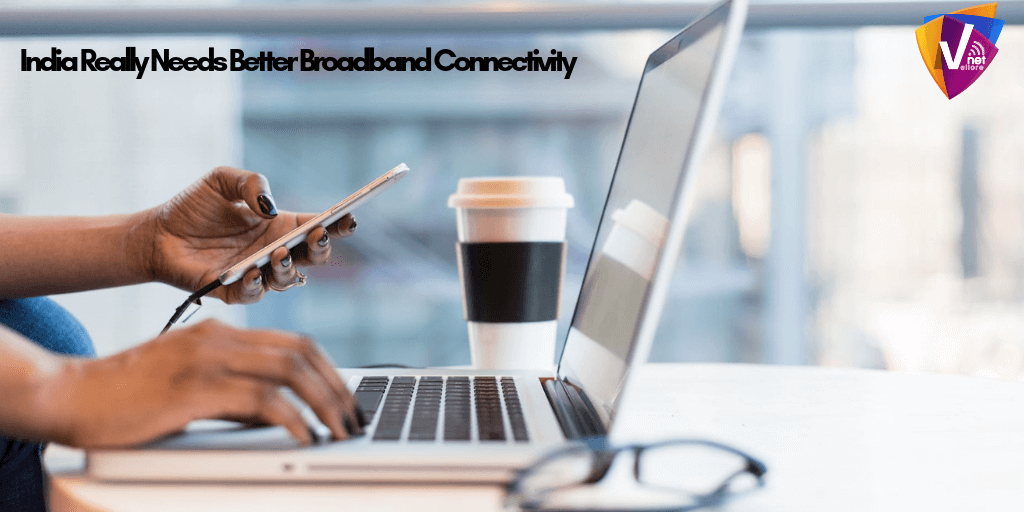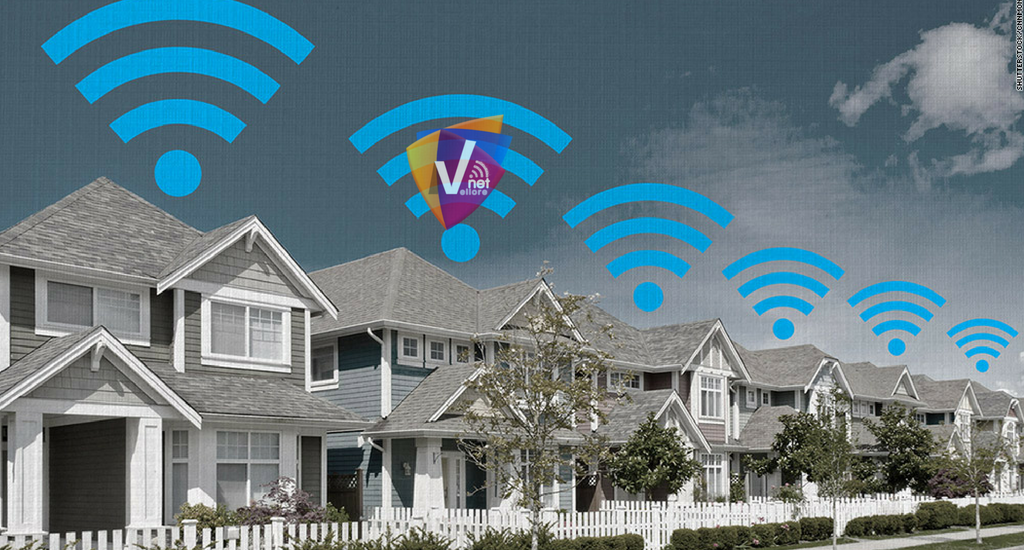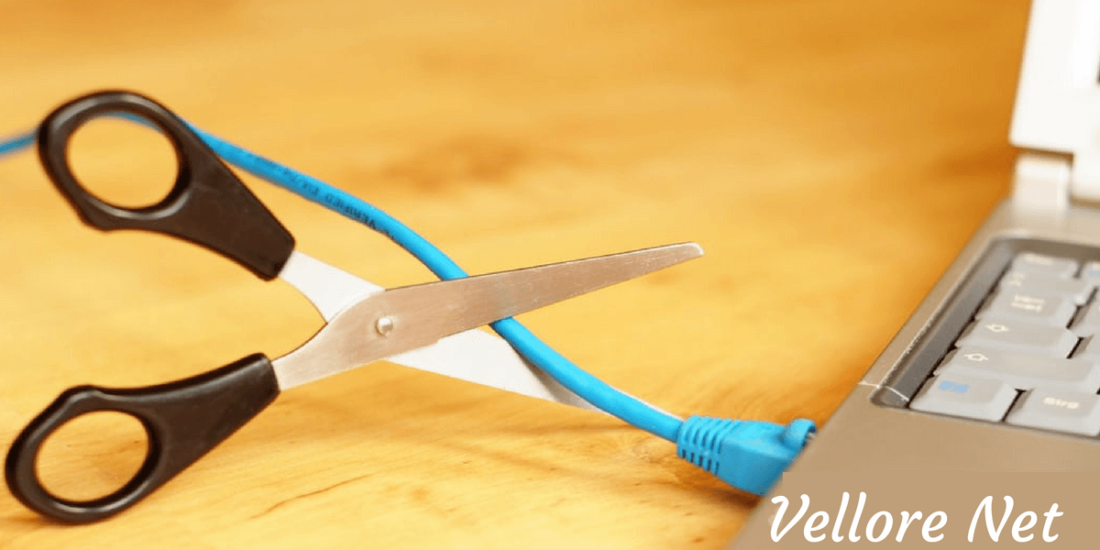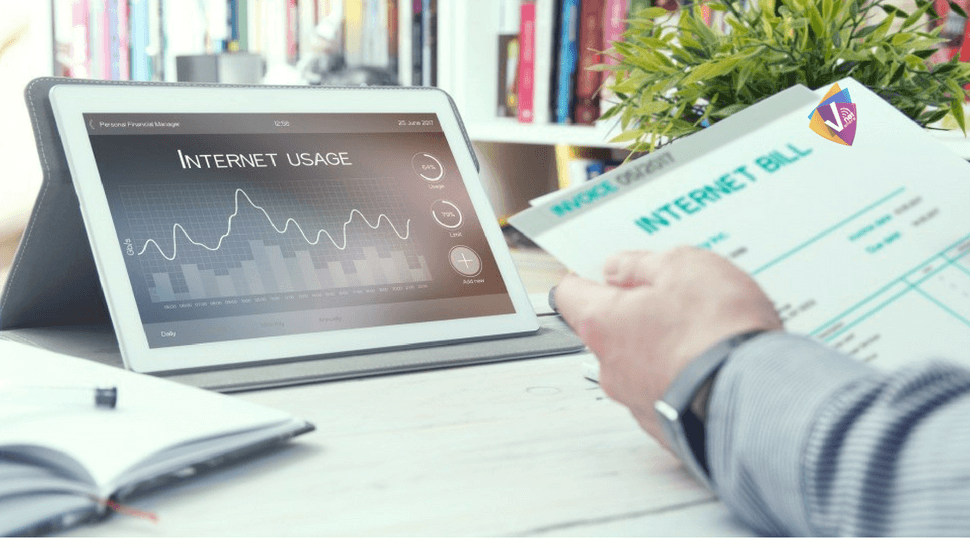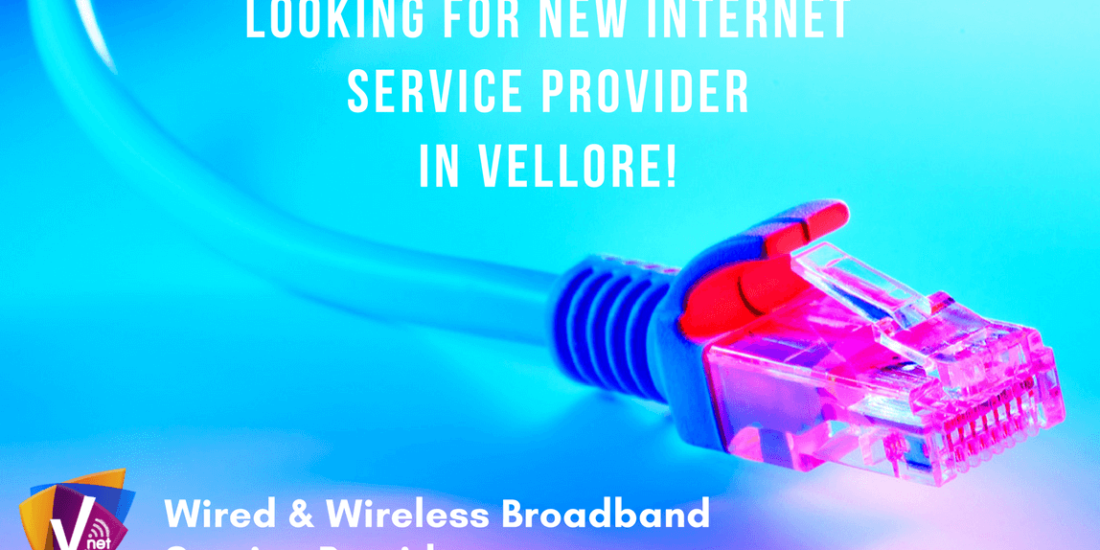India Really Needs Better Broadband Internet Connectivity
Internet population in India is now up to 240 million people. In fact, India is now the third largest Internet user in the world after China and the United States. Despite being in the top 3 in terms of the number of active Internet users in the world, India’s advancement towards a Digital India continues to be disappointed by slow Internet connectivity. Do you know the average Internet speed in India stood at 2.0 Mbps, and India ranked 115th internationally in terms of average Internet speed currently? South Korea is on top with an average speed of 25.3 Mbps and is the only country with average speeds above the 20 Mbps mark. Hong Kong is in 2nd position with 16.3 Mbps while with 15.0 Mbps, Japan on 3rd position.
According to recent calculations, “The number of active Internet users in India will cross the 300 million mark very soon”. Most of the users will be accessing the Internet on their iPhones, smart devices like phones, tablets, etc., at 3G or 4G speeds. But, most Internet service providers reduce the download speeds to about half after users have crossed their pre-defined data-limit for downloading. This affects the average broadband speeds as well as making transactions such as phone banking, ticket booking, etc., very difficult to complete. So, India needs better broadband internet connectivity so as to make efforts towards executing advanced digital services that define the vision of Digital India, for example, smart cities, e-governance, etc.
Vellore Net Redefining Broadband
A reliable and fast broadband service provider in Vellore, TamilNadu is redefining broadband. This service provider has taken plenty of steps towards redefining broadband Internet connection and boasts of several benefits over other ISP in Vellore Some of the key benefits are:
No Problem With Buffering
The most common problem faced by Internet users when dealing with slow Internet speed is Buffering. Vellore Net does its best to provide ultra-fast broadband connections in Vellore that would remove all buffering issues, as a result, uninterrupted connectivity.
Very High Download Speeds
Vellore Net providers high download speeds, so you can download movies, music, games, large amounts of data in quick time. Also, these can be done simultaneously without affecting the speed of the Internet.
Cost- Effective
The Internet plans offered by Vellore Net are affordable and can be afforded by middle-class customers. The customer base of Vellore Net has increased manifold since its inception because the company provides an amazing connection with high download speeds and cost-effective prices for Internet plans in Vellore.
Understanding the Cost of Business Internet Service
A question we hear often is: why is business internet service “marked up” higher than residential services? Business owners, understandably, want to know why they pay more for internet service than their residential counterparts. The short answer: we’re comparing apples and oranges. Residential and business internet, though they may seem the same to the end user, are actually vastly different. Even if, for instance, your office is much smaller than your home, the service you’ll need will likely cost a little more.
How are residential and business internet services different? Let’s dive in and take a look.
Business vs. Residential Internet: The Facts
Before we dive in, let’s explore the term “bandwidth” to set the basis for understanding the many differences between business and residential internet services. Bandwidth is best described as a road. We all know that the more traffic there is, the more congested and slow the flow of cars becomes. If thousands of people are heading home from work at 5:00 pm on a Friday, and they all have to use a two-lane highway, there will be congestion. How do city planners deal with these traffic issues? They build bigger roads with more lanes. A four, six, or eight-lane highway can handle a lot more than a two-lane highway.
Your bandwidth is like this—for both upload and download speeds. If everyone is using the internet at the same time and you don’t have enough bandwidth (or “lanes”), your speed will be as frustrating as rush hour traffic. The bandwidth needs of residential and business internet users are very different. Here’s how.
1. Upload Speed is Essential for Cloud Backup
These days, many businesses are making the smart move to back up their data on cloud-based servers. Even small businesses use Google Drive, Dropbox, and other cloud-based services to keep their data secure and always available. To keep that backup running, a high upload speed is absolutely essential. Most residential internet packages feature a much, much slower upload speed than download speed—a typical package is 20Mbps download and only 2Mpbs upload. This is because most home internet users are downloading, not uploading, on a regular basis, using video streaming and browsing the web. Businesses, on the other hand, maybe (and perhaps should be) running continual backups using their upload speed, and without the right package, these backups won’t work.
2. You Need a Static IP Addresses
If you’re hosting your company’s website and want it to resolve to a server, you’ll need what’s called a static IP address. Same for hosting your office infrastructures such as mail servers, heating, and A/C controls, security cameras, and more. For residential users, this isn’t even available: in fact, there are fewer static IP addresses available these days than there were ten years ago. A static IP address is a necessity for today’s businesses, and it’s part of what comes with a business internet service package.
3. Businesses Don’t Share Connectivity
A typical residential internet connection is shared in a neighborhood. An internet service provider can run cable or fiber into a neighborhood gateway and serve a block or two. For businesses, an ISP will run a dedicated, direct connection, meaning you won’t lose connectivity or experience slowdowns during peak usage times of the day. This is important for productivity and morale levels: no one wants to work harder just because they’re dealing with internet issues.
Want to learn more about business internet services?
Check out this link: https://www.vellorenet.com/wired-wireless-broadband-internet-plans-vellore/
How Do Internet Service Providers Deliver Internet for Your Home
Internet access is pivotal in this day and age, as most of our devices at home and on-the-go require access for us to get things done.
But how do we know what our internet options are?
In this blog, I will give a brief overview of the most common ways the internet is accessed and how to choose the best option for your needs.
Options for Internet Access
Dial-up is not commonly used or offered these days but is important in the introduction of how internet connections work.
If you are old enough to remember getting your home’s first computer, chances are you recall the classic static and beeps while dialing in to get online.
Dial-up worked by taking digital signals from your computer and turning them into audible sounds that would be carried over home telephone wires and then translated back into digital signals translated by computers.
Internet connections essentially still work this way, but the signals and materials it travels through have been upgraded substantially, increasing the speed of information (and there’s no longer a need for your phone to be tied up while you access the internet)
DSL
Instead of just sending voice data through the phone line, now data can be sent simultaneously, and at a higher frequency, so both your phone and your internet connection work at the same time.
A signal filter sorts out both and allows data and voice to be delivered appropriately to either the phone or computer.
In the past, it was relatively easy to upgrade to DSL since it used the existing phone lines to deliver information.
The downside to DSL is that it tends to have slower speeds than other internet connections and is still routed through a phone line. So if you need fast internet and don’t have a phone line set up for your home, it’s unlikely this is an option for you.
Cable
Most of us are familiar with and have access to cable TV. Cable television essentially uses different frequencies through a coaxial wire to access each channel your specific plan provides.
Cable Internet, simply stated, is just another “channel” or frequency that is installed by cable companies for you to access the internet.
A modem sorts out the frequencies and delivers them in appropriate formats to your TV and computer, allowing both TV and internet to work simultaneously.
Wireless
A wireless internet connection is unique, such that it uses radio frequencies to send an internet signal to a location.
The wireless ISP sends signals to a tower, which receives and sends the signal to your home.
A receiver (often roof mounted so it can point directly toward the tower) picks up the signals and sends them to your home modem to provide a connection.
Because the internet is delivered through different frequencies, you’ll need to establish what frequency receiver you need based on your proximity to a tower, but this is made simple when you work with a reputable internet service provider such as VelloreNet.
Satellite Dish
With a satellite connection, communication is between a satellite ISP transmitter (located in the sky) and a dish receiver, which is located on your roof.
Using high-frequency radio waves, these three items communicate while a modem translates the signal from your dish to your computer.
The satellite has many hindrances due to the distance the signal has to travel, making it a slower option than others on the market.
Mobile Internet
With the prevalence of smartphones, many people use the mobile internet every day.
Using radio waves, voice and data are transmitted at the same time to and from phones. How the data is relayed through the cell signal varies, depending on if a phone user has 3G, 4G, or LTE. And coverage depends on a mobile carrier, not an internet provider.
So the real burning question, why does the cost vary so much for different types of internet service?
While all these services differ in speed, cost, and effectiveness, thinking about where you live and what you use the internet for can help you choose the best option for your needs. Need help deciding on the best option for you? We can help!
Don’t Cut Corners on Your Business Internet Service
You have high standards for your business: you require everything you do to meet your expectations of excellence. From customer service to the products and solutions you provide, you’re consistently aiming high. The tools you use to get the job done should do the same thing, and none more so than your business internet service.
Most successful business professionals will agree: the way to the top of the competitive ladder isn’t through cutting corners. And yet, many companies are relying on outdated internet service technology, meaning they’re left with spotty service and slow results. They experience frequent slowdowns and system-wide failures; their employees are always complaining about how long it takes to do anything around the office because of slow internet.
Why would a smart business cut corners in internet services? Most of the time, it’s not intentional. Company management sometimes isn’t aware they’re getting a bad deal, instead, assuming that the package they’ve purchased should be adequate. Other times, it’s just a matter of misunderstanding how much good internet services cost: business managers will assume that if they want a better internet, they’ll have to pay far too much—and this just isn’t true.
Here’s what you should demand from your internet service provider. If you’re getting anything less, it’s time for a change.
Bandwidth and Then Some
The most common issue for businesses is a lack of bandwidth. Of course, your needs will vary—and even change over time—based on how many employees you have and what your company does day-to-day. But it’s always worthwhile to have enough to handle heavier workdays as well as the lighter ones. You have a few options for your high-speed internet needs.
- Ethernet/DSL: Ethernet or DSL (Digital Subscriber Line) technology works over local phone lines to transmit data. Although it became quite popular as users began to move away from dial-up modems, it’s an outdated solution by today’s standards and not very reliable.
- Cable: A standard coax cable line can provide your business with cable internet services. This is an attractive option but can cause bandwidth issues during popular usage times since it’s shared among many businesses and residences.
- Fiber: Fiber internet is the most versatile option for a business. It’s completely scalable—meaning that you could start today with a smaller package and upgrade later as your company grows. You’ll never pay more than you need to.
- Wireless internet service delivers reliable internet connections in areas where DSL, cable, or fiber optic options are not available. If your business is located in a rural area, the wireless internet allows you to get and keep your business online.
Make sure you’re asking the right questions before signing an internet services contract, starting with how much bandwidth you’ll need to accomplish your regular online tasks.
Security
There is no wiggle room in the reality of business today: you can’t cut corners on internet security. As we’ve seen from the high-profile hackings of companies like Sony and Target, your internet security must be top-notch to withstand the increasingly sophisticated threats from spammers and online criminals. Any company you work with should be able to prove their commitment to security.
Fast Issue Resolution
If you have an outage or an on-site failure, you need assistance immediately. This is as crucial as having the electricity up and running at your office location, and your internet service provider should treat it that way. You should be able to count on quick resolution so you can get back to your job with less downtime and no hassle.
An Eye Toward the Future
You don’t have time to keep up with ever-evolving technology, but keeping up is a significant part of success in today’s business world. Your internet service provider (ISP) should be able to help you stay current with technologies that will contribute to your business’s productivity and should plan for the future.
Ready to demand more from your internet service provider? We make the internet easy.
The 5 Stages of Losing Internet Service and How To Skip Them
We can’t quite remember what we did before the internet. It seems that work used to be done by professionals pre-internet, but these days, we use the world wide web to accomplish almost everything. When your internet goes down at your home or your office, work virtually comes to a halt.
But that’s not all that happens when your internet service goes dark and you find yourself disconnected from the world. It’s almost like you go through the stages of grief—that could include smashing a few things or screaming into pillows (but hopefully not that dramatic). According to our highly scientific research, these are the stages you can expect to experience when your internet goes down.
What You May Feel if You Lose Your Internet Connection
Denial
At first, you can’t believe it. You keep hitting “refresh” while woefully informs you it’s lost network connection or you frantically try to save your report you were typing into a cloud server.
You turn to your co-worker and ask, voice shaking, “Do you have internet?”
You frantically call the IT department. “Tell me the internet isn’t down. PLEASE. This can’t be happening right now.
Anger
From there, it’s a fast spiral into the most volatile stage of internet loss: anger. You realize you’re stuck in the middle of a Stranger Things episode until further notice, or you truly have lost every last bit of your report that you didn’t save.
In this stage, we suggest taking a coffee break to cool off. We know there’s nothing more frustrating than losing your internet service.
Bargaining
You calm down and start trying to fix the problem. But since you’re not an IT expert and you just need your internet to work, you’re stuck turning things off and on over and over again. Every time your router blinks on and off and your computer restarts, you’re pleading: “Please work, please work, please work.” Without expert support and a closed loop fiber backbone, your bargaining is likely to be in vain.
Depression
You’re beginning to realize there’s no way out of your internet black hole. You’ll just have to live here, alone–no Netflix, or email, or cloud, or productivity. Goodbye, cruel world.
Acceptance
You become a hermit, forget there was ever such a thing as 24/7 internet access,
Alternatively, you could choose Vellore Net options and skip this entire process—if that appeals to you, of course. We work tirelessly to save our customers from the grief of losing the internet. Because of our commitment, no Vellore Net customer is ever dropped—guaranteed. Our closed loop fiber backbone in Vellore providing a redundant connection so your internet won’t go down.
What Does This Mean for Vellore Net Customers?
Even if the line were cut, a signal would still flow. With Vellore Net, you can skip the stages of internet loss (even in rural areas) and instead focus on getting stuff done or on enjoying your Internet Service.
Vellore Net – the network for gamers
Most internet service providers (ISPs) tend to sell their service based on two variables: bandwidth and data allowance. For the most part, this is enough information for potential customers to make a decision about the service (and provider) they will ultimately choose. There is a group of users, however, for whom the above, while important, should certainly not be the be-all and end-all in any decision.
So why do we believe that Vellore Net should be the ISP of choice for gamers? There are a number of additional factors that gamers should take into account when choosing an ISP, which will be discussed below.
No doubt, keen gamers will already be aware of much of the terminology that follows. Some explanation will be given, however, if only to serve as a reminder or as an introduction to those new to the world of gaming.
Latency
Latency, or lag, or ping will be a familiar term to many online gamers. In perhaps its simplest terms, it refers to the amount of time it takes a packet of data to reach its intended destination. For gamers, a more vivid explanation might come in the form of the following example:
Imagine playing a first-person shooter game, pressing the trigger to shoot an opponent, and then waiting a second for your weapon the fire in the game. This would be an extreme example of lag, and in such a scenario your character probably wouldn’t last very long.
For gamers, a simple rule applies: the lower the latency the better. Anything under 100ms should be acceptable but the ideal aim should be for latency to be no more than about 30-50ms.
A somewhat related concept, jitter, is the variation (in milliseconds) in latency.
If you have a typical latency of 100ms and zero jitters, gameplay would tend to be very smooth and predictable. However, if your jitter was, say, 100ms then this means that on occasions your latency might be as high as 200ms.
Like latency, the goal is for your jitter to be as low as possible. Many gamers talk of ‘latency spikes’ – moments when latency suddenly jumps up to unacceptably high levels. This is invariably caused by the jitter of the connection.
If you are experiencing high levels of latency or jitter, there are some steps you can take to improve the situation:
⇒ Use a wired connection (that is, physically plug your PC or console into the router) rather than wireless if possible. This is likely to produce a notable improvement
⇒ Shut down bandwidth-consuming processes on your PC – if you’re downloading or streaming something while you’re gaming, this can have a considerable effect on latency.
A good internet connection should provide low-enough latency and jitter to enable smooth online gaming most of the time and, from this point of view, typically, there will not be many variations between providers.
Occasionally, though, problems with latency can crop up due to issues on the line, or on your ISP’s network. The advantage of choosing an ISP like Vellore Net is the expert service and tech support you will receive. Our staff will work to ensure that you receive the very best product at all times, and that includes working to improve your latency should there be an issue.
Speed
Speed is a much more straightforward concept to deal with – the higher the better, right?
Well, we will examine shortly why a faster connection can indeed be of great benefit. However, for the actual playing of games connection speed tends to show diminishing returns once a certain level is achieved.
For many online games, much of the processing tends to take place locally (on your machine). The amount of data that gets transferred in a second is usually fairly low. For this reason, a connection of about 1Mbps is usually adequate for playing games online.
There is a fairly major caveat to this, though. This might be considered a benchmark figure, but it leaves little margin for error. If other people are using your connection at the same time, if you’re also engaged in voice chat with your gaming colleagues or if your connection speed tends to vary, then a 1Mbps connection might not be enough.
However, given that the vast majority of connections today are much quicker than this, the chances are your connection speed will be more than adequate for your gaming needs.
Where speed does become an important issue is in the downloading of data. Whether you’re downloading entire games (which might be tens of gigs in size) or sizeable game updates and patches, a fast internet connection can be of real benefit. The faster your connection, the sooner your game data will download, and the sooner you can get on with playing.
Data allowance
As mentioned above, the amount of data you use while gaming is likely to be fairly low. For this reason, it is not essential to have a huge download limit if you are predominantly using the internet for playing games.
However, as also touched on above, many gamers today not only download their games from online repositories but frequent game updates can often be several gigabytes in size. For this reason, a good (preferably unlimited) data allowance is recommended.
Traffic management
Many ISPs advertise a certain feature, such as a particular speed or download limit, but tend to provide varying degrees of traffic management.
For example, an ISP might slow down your connection speed at certain times of the day, or when you’ve downloaded a certain amount of data in a month.
As well as throttling speeds, an ISP might put restrictions on certain types of traffic passing through their network.
At Vellore Net, you won’t be victim to this type of management – we believe in providing you with what you’ve paid for. This means that, if you’re downloading lots of games, or you like to play even during the busiest periods of the day, you shouldn’t experience any degradation in performance.
Stability and reliability
It doesn’t matter how fast your connection is, or how low your latency is if your internet is going to be disconnecting every few minutes.
A stable, reliable internet connection is absolutely critical for online gaming.
At Vellore Net, we care about your experience, and we’ll do our utmost to ensure that you receive the best experience possible, no matter what you’re using the internet for. Check out our packages here.
Fixed Wireless Broadband Is The Perfect Option For Education
Technology has slowly become essential in classrooms around the world. With many students using laptops, tablets, and even their phones to learn the ABCs, it’s important for schools to not only get online but to stay online.
Many teaching aids need a stable connection. Teachers need to stream videos, hold web conferences, and have interactive online discussions with their students. But sometimes, that can be difficult to accomplish, especially in rural areas where many students use DSL to get online.
But this is where wireless broadband can help.
THE PERKS OF ONLINE LEARNING
Online classes have become more and more popular in the last few years. It gives students a chance to learn and study anywhere they choose. It can also provide a more intimate environment for students, where their voice can be heard as opposed to a lecture hall filled with students. E-learning also allows flexibility for the student to study on his/her time. It also teaches the student about self-discipline and responsibility.
But for an online classroom to be successful, the tools must be available for teachers and students to connect.
HOW FIXED WIRELESS BROADBAND CAN HELP EDUCATION
Fixed wireless is the best solution for schools across the country. It provides the stability needed when holding an online discussion or streaming digital media. And since the connection is stronger and quicker than a wired network, large files can be transferred quickly and securely from teacher to student.
It’s also the only reliable option for students who live in rural areas who may have to travel a great distance to reach a classroom. Unfortunately, students in rural areas around this country cannot get a fast internet connection. Wired or fiber connections are just not feasible due to the location of the student. But fixed wireless broadband can give students lightning fast speeds no matter where they are located.
Wireless broadband is not only great for the online classroom; it can also benefit those inside a school building as well. With many resources available to students online, a trip to the library to do research means finding the answers a research paper quickly. It also helps schools communicate quickly with each other. For example, many universities have a main campus and satellite campuses in various locations. With the help of fixed wireless, the university can easily communicate with its satellite campuses.
HOW CAN VELLORE NET, HELP YOUR SCHOOL?
If you are an educational institution that is interested in fixed wireless, it’s best to speak with an expert from Vellore Net. to guide you on the proper equipment. Contact Vellore Net .today to see how we can assist you.
Ways to Save Big on Your Next Internet Bill
Even if you’re happy with your current internet service, you might be paying too much for it. We’ve rounded up some ways to find best internet service and lower your monthly internet bill.
Here are five tips to help you reduce the cost of the Internet:
# Limit up Data Transfer Seep:
You all might be knowing that if you are online and are using up the internet with the high-speed networks, then there is always more data usage for the similar things then that in slow network connections. So here the thing is that most of the time we don’t need up that much speed while browsing the internet or downloading anything etc.
But we still go on with the high-speed data transfer rate only. And that thing becomes the cause of greater data usages hence more internet bill rate. To lower up the data usage while doing online activities just remember to set up the speed limits for the internet connections which in turn will help to decrease the data usage efficiently.
# Check the Actual Internet Speed:
The very thing that you should also actually do after getting your new Internet connection is that you should test the web speed that you get on your devices and find it whether it is the same to the data plan that you have to choose up.
This will either not directly help you to lower the internet bill but will help you to check whether if the ISP service providers throttle you or not. ISP service providers sometimes do not give the promised speed according to the data plan selected by the customers; hence they get to pay more than what they should be doing.

# Know and reduce your usage:
The chart below shows common internet activities and the bandwidth they require. Keep in mind that your total bandwidth is shared by all the devices on your connection.
If multiple people are online simultaneously, you’ll need enough bandwidth for everyone.
- What internet speed do you need? General web surfing, email, social media: 1 Mbps
- Online gaming: 1-3 Mbps (A connection with low latency, the time it takes your computer to talk to the game server, is more important than bandwidth for gaming.)
- Videoconferencing: 1-4 Mbps (You’ll want at least a 1 Mbps to upload speed for quality video conferencing.)
- Standard-definition video streaming: 3-4 Mbps
- High-definition video streaming: 5-8 Mbps
- Frequent large file downloading: 50 Mbps and up
Now you can figure out whether you’re paying for too much bandwidth. If so, the easy fix is to drop to a lower tier with your current provider. Or it might be time to choose a new one with prices and service levels more suited to your usage.
# Buy your modem and router instead of renting:
If you plan to stay with an internet provider for a long time, usually more than a year, it might be more cost-effective to buy your internet hardware rather than renting it.
Keep in mind that some providers won’t offer support or troubleshooting for your personal hardware.
# Jump Ship
If your ISP won’t budge, it might be time to switch providers or cancel your Internet altogether. This seems drastic, we know, but depending on your Internet needs you may be able to get away with sticking to free local Wi-Fi spots instead of having home service.
If a connection at home is a must, don’t be afraid to take your business elsewhere. Many companies provide introductory offers for new customers and some even offer incentives to switch. Contact all of the ISPs in your area and see which can give you the best deal. Make sure you’re not in a contract with your current provider before signing up with someone else so you can avoid getting hit with a fee for breaking your contract.
If you need to save money while maintaining the internet connection, you might want to downgrade to a limited-data mobile hotspot plan. You can find cheap prepaid data-only plans here.
If these five strategies inspired you to start fighting for a lower Internet bill, don’t stop here. Keep looking for other ways to cut costs and reduce your monthly Internet bill. The more you save, the better you’ll feel.
Choose the Right ISP, the Right Way!
The internet is undoubtedly one of the essential services you use. It allows you to be in touch with family and friends, enjoy countless entertainment options, send emails for professional and personal purposes, shop various goods, browses a virtually limitless library of information, and so much more.
Choosing the best internet service provider can give you real value for money, with faster and more secure internet and even better customer service. Unfortunately, recognizing which ISP provides the best value can be challenging. Here are five things you should know before choosing the right fit.
Broadband Usage Limits
In our country, the majority of the ‘unlimited’ internet packages are controlled with bandwidth caps, or Fair Usage Policy (FUP). The provider usually informs this, but you need to find out whether your ISP includes both download and upload usage, as this service differs from provider to provider. If an ISP offers upload usage and you might not have downloaded anything, but even posting photos and videos on social media could exhaust your data. It’s crucial to know this before selecting any internet plan.
Contention Ratio
While users are aware of the Fair Usage Policy and speed of an ISP, contention ratio is something no one enquires about. Contention ratio refers to the key metric that calculates the maximum number of users that can share the fixed bandwidth on one line simultaneously. So, despite choosing a high-speed internet connection, if the number of such users using it is large, it means that the contention ratio is high. This will cause the resulting internet speed per user to be less.
Upload Speeds
Another crucial factor that is overlooked is the upload speed of the connection. The internet speeds which are advertised are usually applicable just for downloads only. Nowadays, users are more into uploading content on the internet, whether it’s for social media, gaming, work-related uploads, or even for video calling. In these cases, upload speeds are as vital to the user as the download speeds. We at Vellore Net, ensure that you not only get 100% of your plan’s speed but also there is no ‘up to’ clause.
VAS
Entertainment has always been a very important part of our lives and now in this digital age we’re living in, the internet has become a key source of our entertainment. Vellore Net makes sure that users experience the best in entertainment with its amazing Value Added Services. From Hollywood, Bellwood and Regional Movies to live TV and more you can explore great and quality content at your fingertips.
Quality of Service
One of the most important things to consider is the quality of service. In case of any service issue, right from the ease of reaching out to your ISP to the time taken for resolution, determines the trust a customer is willing to invest in their ISP. Vellore Net customers can reach out to us via call center, helpdesk ID, etc. Also, we ensure that the requests are acted upon promptly and also resolved on priority.
Pricing
We are sure that you don’t like to spend your hard earned money on an unsatisfying service, so comparing the prices of different internet service providers and considering the services provided for the given cost is a no-brainer. However, it’s best not to choose your ISP solely based on its price. It’s crucial to consider the points mentioned above and make an informed choice. We at Vellore net recognize the requirements of our users and suggest them the most suitable plan.
Irrespective of the fact that you currently browse on broadband or are thinking of booking a connection for the first time, it’s best to get familiar with the terminologies of an internet plan to make a wise decision.
We at Vellore Net, take pride in being Vellore’s largest broadband service provider we have a wide range of plans suiting the needs of users of all types.
To check the availability of Vellore net in your locality, click
Important Questions to Ask Before Signing Up With an Internet Service Provider
Looking for New Internet Service Provider
Hope, you have decided to sign-up an internet connection enjoy the fast speed and save some bucks. Well, don’t hire just a service provider. To enjoy all the convenience and serve all your purposes, it is crucial that you choose a reliable service provider and the most suitable deal. You must have a clear idea of what you will find against the money you will pay. Instead of getting disappointed later, focus on every essential factor before making a final decision.
Here are some important questions, an individual should ask your internet service provider. These questions will help you to get the maximum returns on your money.
1) What is the total fee? What are the fees, taxes, and charges, etc. include in the fee?
Don’t think that you just need to pay the figure promoted by the company in a special deal. There is a possibility of some hidden taxes, and charges, etc. Most companies charge something extra for installation, equipment, and subscription, etc. No one wants to pay anything extra for the first time or every month. Make sure you that you are not paying anything extra.
2) What are the monthly plans and their cost?
Don’t just focus on onetime payment, gather the details monthly plans. It will help you to choose the best plan that suits your needs and budget. Every person has specific needs and by gathering complete details, one can make a right choice. Apart from fix rate plans, you can also ask about hourly plans and rates.
3) Are there any service limits?
Some internet service providers in Vellore claim to offer unlimited usage, but the fact is there is a hidden limit. Once you cross that limit, you will need to pay extra. To avoid any issue and disappointment, it is advised to ask about the limit of each package in advance.
4) What is the duration of the contract? Will I need to pay anything if I will terminate the contract?
Every internet company has any specific terms and conditions along with contract period. Being a customer, you must be aware of the duration of the contract. Some service providers ask for the penalty when a subscriber terminates the contract before that period. Ask about the contract duration along with the associated penalties.
5) How long will it take to set-up the connection?
The installation time may vary from one service provider to another. Usually, it does not take so much time to set-up and run the connection. It will help you to plan various other important and associated things, especially if you are going to sign-up a package for the business purpose.
6) What are the post-promotional rates?
Many service providers offer some interesting deals to the users with the subscription, but you should not forget to ask about the rates after that offer. Make sure you can afford the offers and plans because the promotional period will last after some time.
7) What is the technical support number? When can I access technical support?
Technical issues can arise anytime and there is no way to avoid them completely. Ask the service provider about the technical support number and make sure when they are available to assist you.


